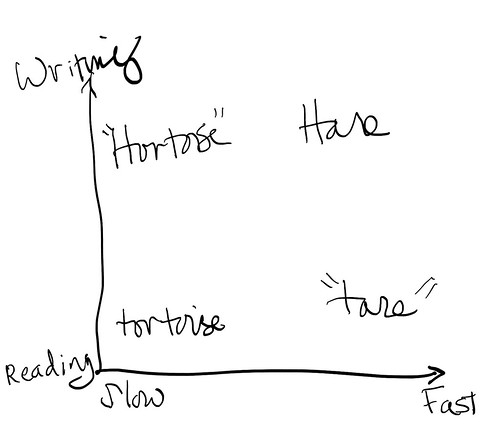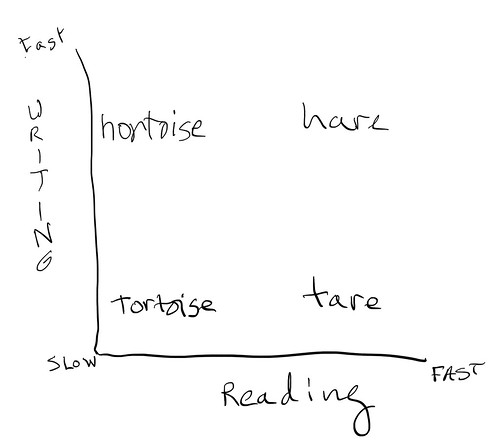The book that caught my eye and that I downloaded from Kindle is the one chosen for age 92:
“Nothing to be Frightened Of”The one chosen for my age, 68, is something I've already read, “The Year of Magical Thinking” by Joan Didion ("Grief can make you feel like you’re losing your mind. That’s normal").
BY JULIAN BARNES
Don’t avoid the big questions of life and death and faith: Tackle them straight on with help from some of the greatest thinkers.
And, no, I've never read "Atlas Shrugged." I tried a little, but I have to like the sentences. I'm a sentences reader.
That reminds me, I wanted to recommend this Malcolm Gladwell podcast that has a lot to say about the kind of people who are slow readers:
The Tortoise and the HareGladwell is himself a "tortoise" — a slow reader — and he doesn't like the way his kind are disadvantaged on the LSAT.
A weird speech by Antonin Scalia, a visit with the some serious legal tortoises, and a testy exchange with the experts at the Law School Admissions Council prompts Malcolm to formulate his Grand Unified Theory for fixing higher education.
A "tortoise"-type reader is not going to do well with "Atlas Shrugged"!
By the way, Gladwell talks about the condition of being a slow reader and a fast writer. I have that too. It's why blogging works well for me. I can find and isolate the sentences I find rich and readable — slowly readable — and I can flow very quickly writing about them. In this light, you can see that this tortoise/hare thing is not binary. There may be tortoises and hares, but there are also "hortoises" and "tares." If it's just tortoises and hares, it might be easy to say, yeah, it's just that some people are smarter than others. But if you see reading and writing (or reading and analyzing) as separate axes, with fast to slow on both, people are more complexly differently abled. Diagram to come....
ADDED: Oh, no, no, no... my idea of a diagram with axes and quadrants is defective. I had to try to draw it to see the problem!

Reading does not progress to writing the way slow progresses to fast. Please suggest a way I can draw this idea!
AND: Allison explained the solution and, with her help, I easily got it right:





209 comments:
«Oldest ‹Older 201 – 209 of 209“Pour apprendre á lire, il faut d’abord lire trés lentment, et ensuite il faut lire trés lentment, et toujours, jusqu’au dernier livre qui aura l’honneur’ d’être lu par vous, il faudre lire trés lentment.” - L’Art de lire
Thanks, Nobody. I could read that, slowly. And I love the idea of immense self-respect found in slow reading.
I read the first four Robbins books back in the 80s and was quite a fan for a while, and would agree that he writes really well in the sense that he puts words together in memorable ways. Creates interesting characters, writes funny and compelling dialogue, etc. Entertaining as hell but philosophical too. Very unique, in my experience.
Plots are a little out there though, and you have to be ready to go for a ride in Robbins’ mind. He does make it easier with the humor and quirky characters.
Of those first four books, I liked Jitterbug Perfume the best and Another Roadside Attraction next, and recommend both to anyone looking to read his early stuff. Jitterbug Perfume was really good. Highly recommended, from a distance of 35 years! YMMV.
From Robbins’ Wikipedia page, a quote about his writing style: "When he starts a novel, it works like this. First he writes a sentence. Then he rewrites it again and again, examining each word, making sure of its perfection, finely honing each phrase until it reverberates with the subtle texture of the infinite. Sometimes it takes hours. Sometimes an entire day is devoted to one sentence, which gets marked on and expanded upon in every possible direction until he is satisfied. Then, and only then, does he add a period".
I have no idea if that’s accurate or not, but I can believe it. It shows.
OK, that’s the tl;dr version of a long passage in French.
Heh. Why would I want to read a longer version of a false statement?
[Robbins] 80s and was quite a fan for a while,
#metoo. Now his writing just seems contrived and repulsive, somehow.
Now his writing just seems contrived and repulsive, somehow.
Thinking back a bit, his writing was contrived, the content was repulsive, e.g. his description of a muslim shithole: "Timbuktu. The last pure place. Isolation being the mother of purity. All men are jealous of Timbuktu because Timbuktu is removed from men, it's the wholeness men have fractured, the sacred extreme they've traded away."
Pure load.
Agreed Ferdinand. Robbins likes to deliver lectures through his characters and while my 25 year old self found it entertaining there is just no way I could tolerate loads of bullcrap like that any more. He was very hostile to religion too.
So yeah I’m now very conflicted on the guy. Great writer, but an insufferable tool. That combo seems to occur in nature a lot!
Despite all that baggage, his practical and philosophical messages about living life are still pretty solid. Still Life was about “making love stay” and Jitterbug was about longevity, and I took both to heart to some extent.
Slight edit on my first Robbins post: my second favorite was Still Life, not Roadside. Whoopsie.
I don't ascribe to Rand's philosophy, but Atlas Shrugged was one of the most prophetic books on the dangers of socialism (without naming it as socialism) that I've read. I read it when I was 18 and loved the story, but didn't catch the larger themes. That happened much later when I read it a second time. It may not be great literature, but definitely worthy of a second look.
Post a Comment